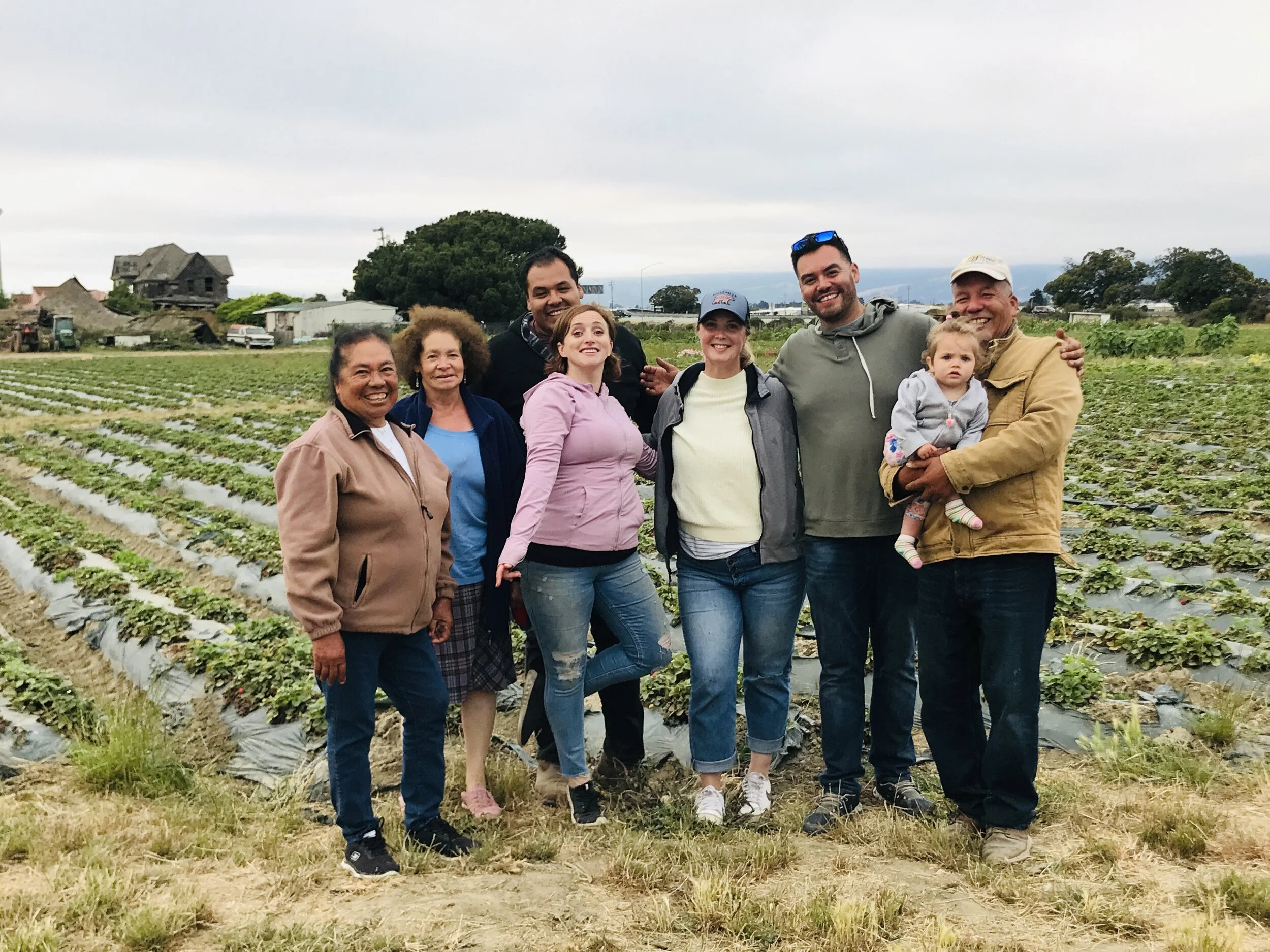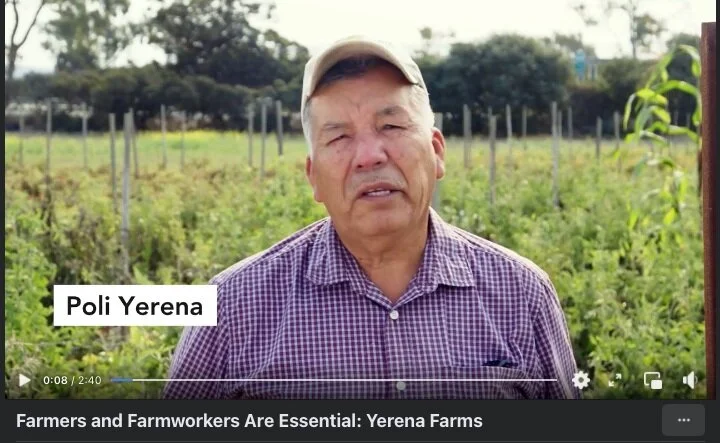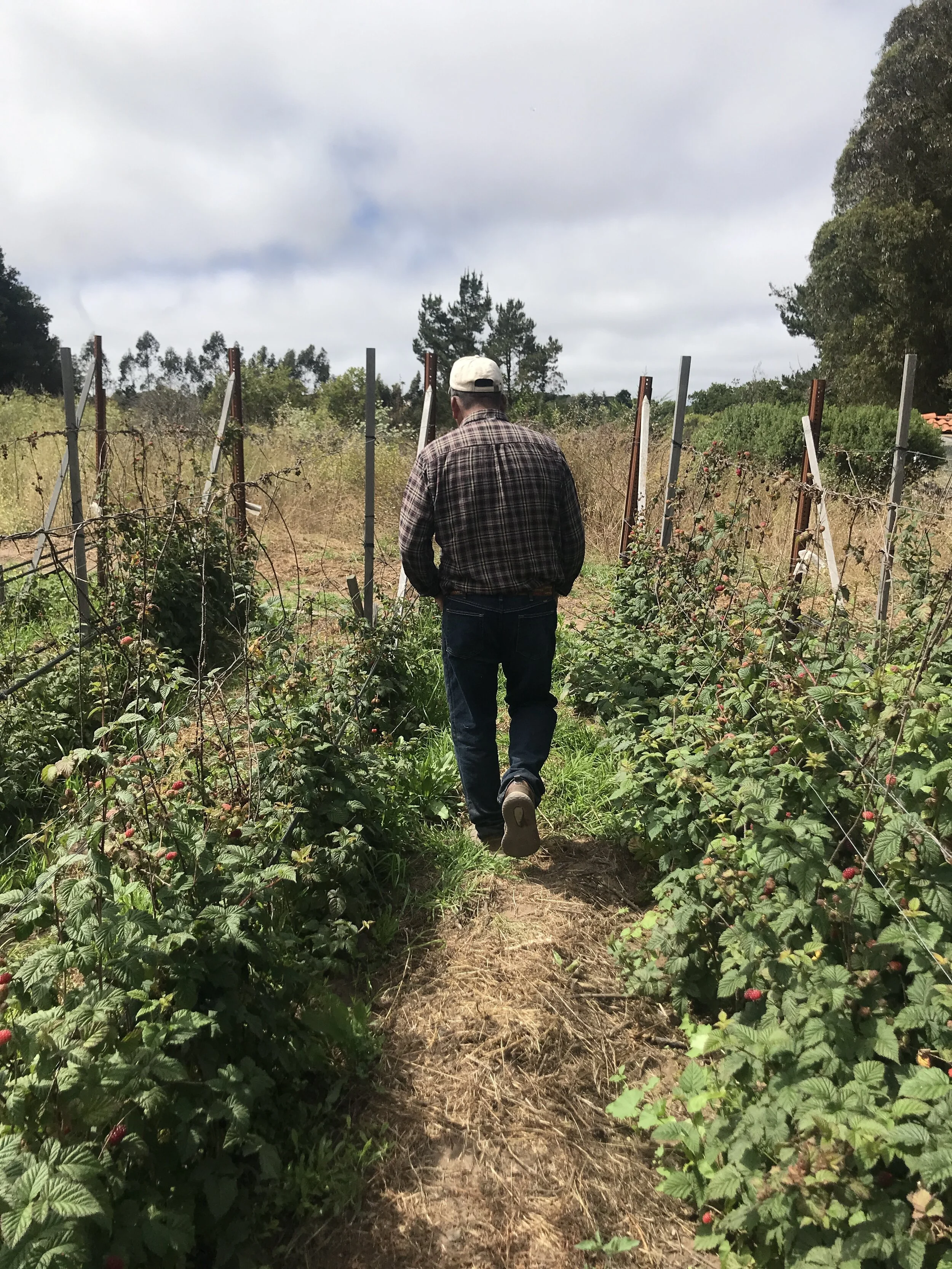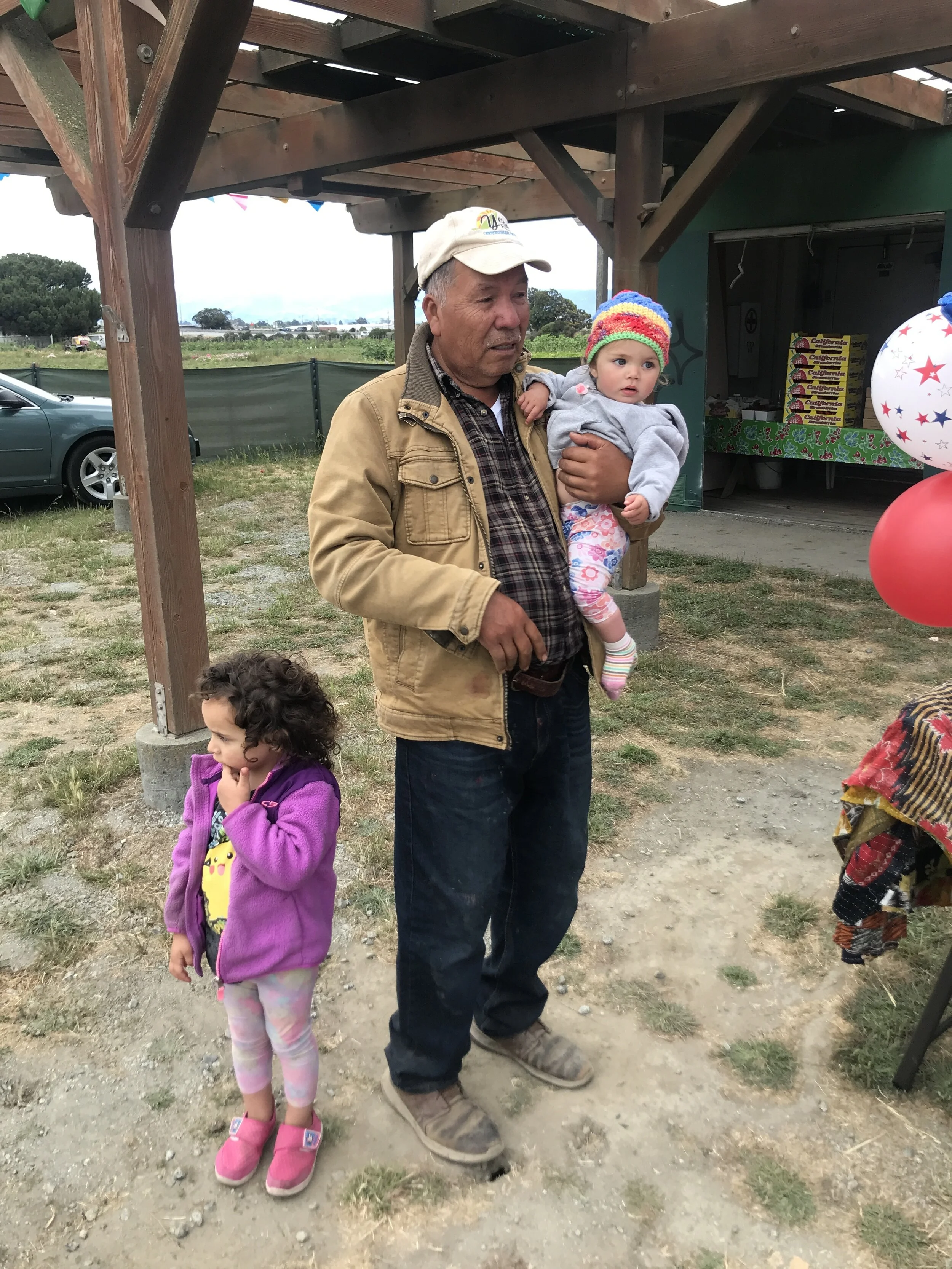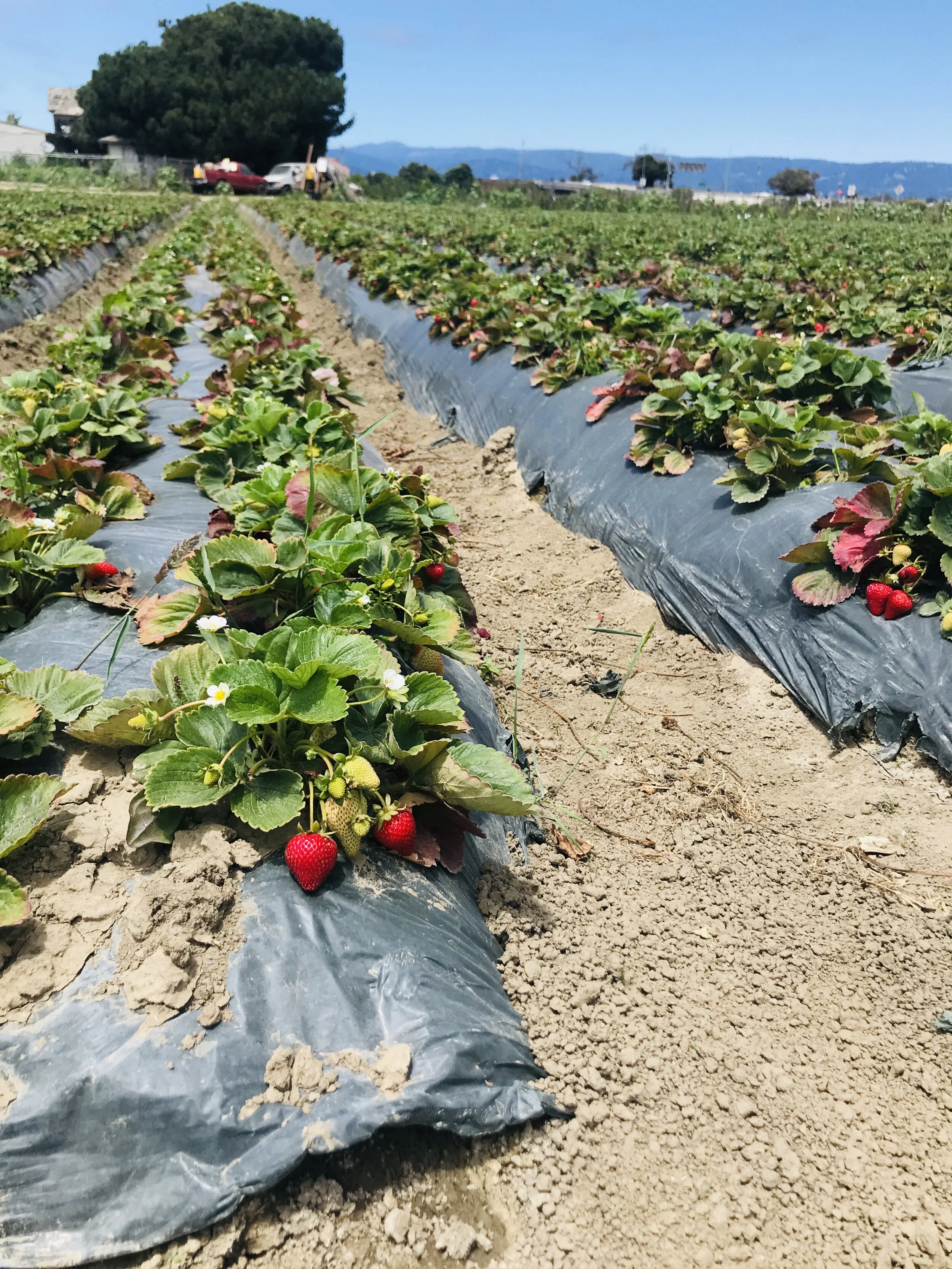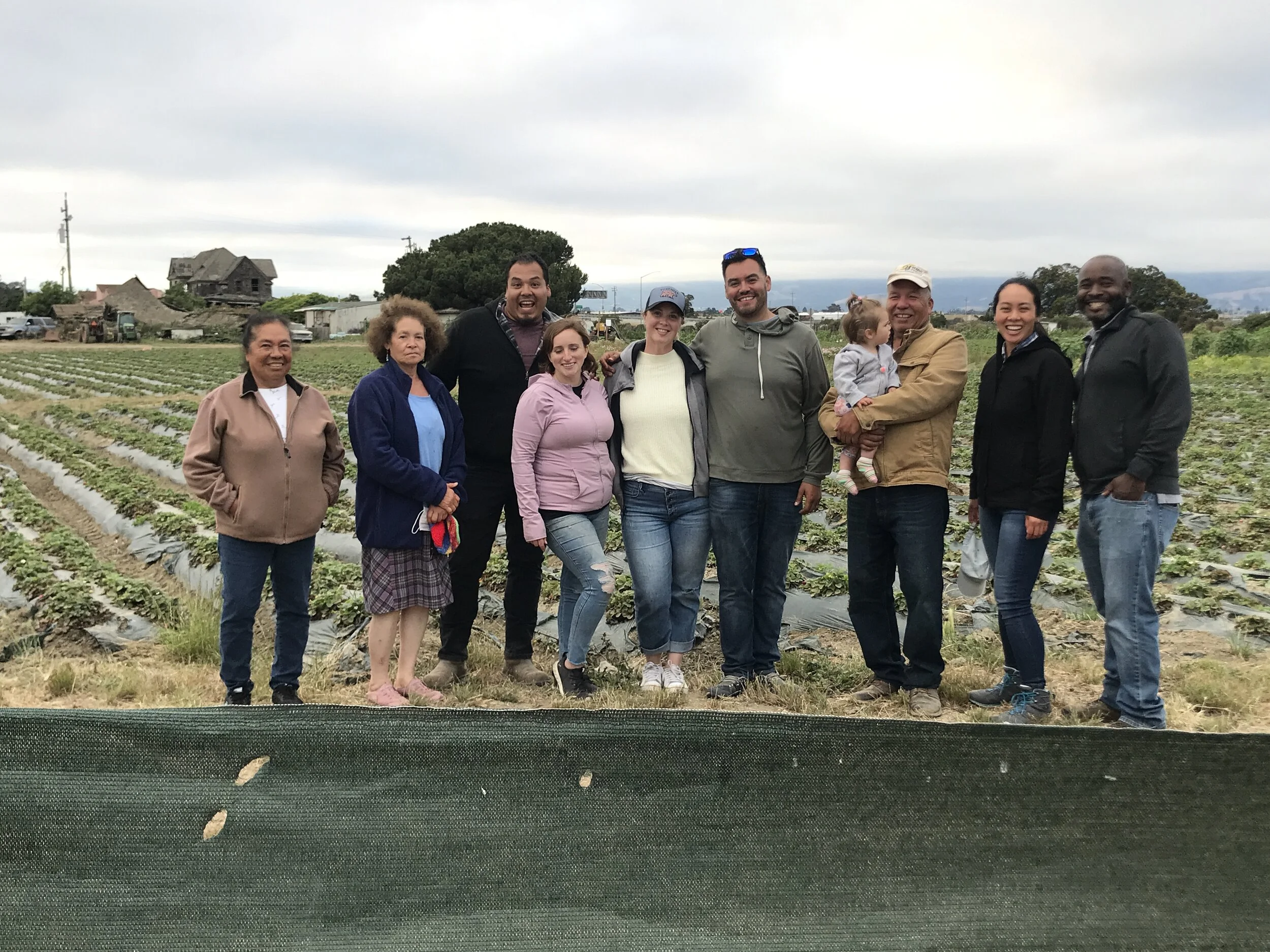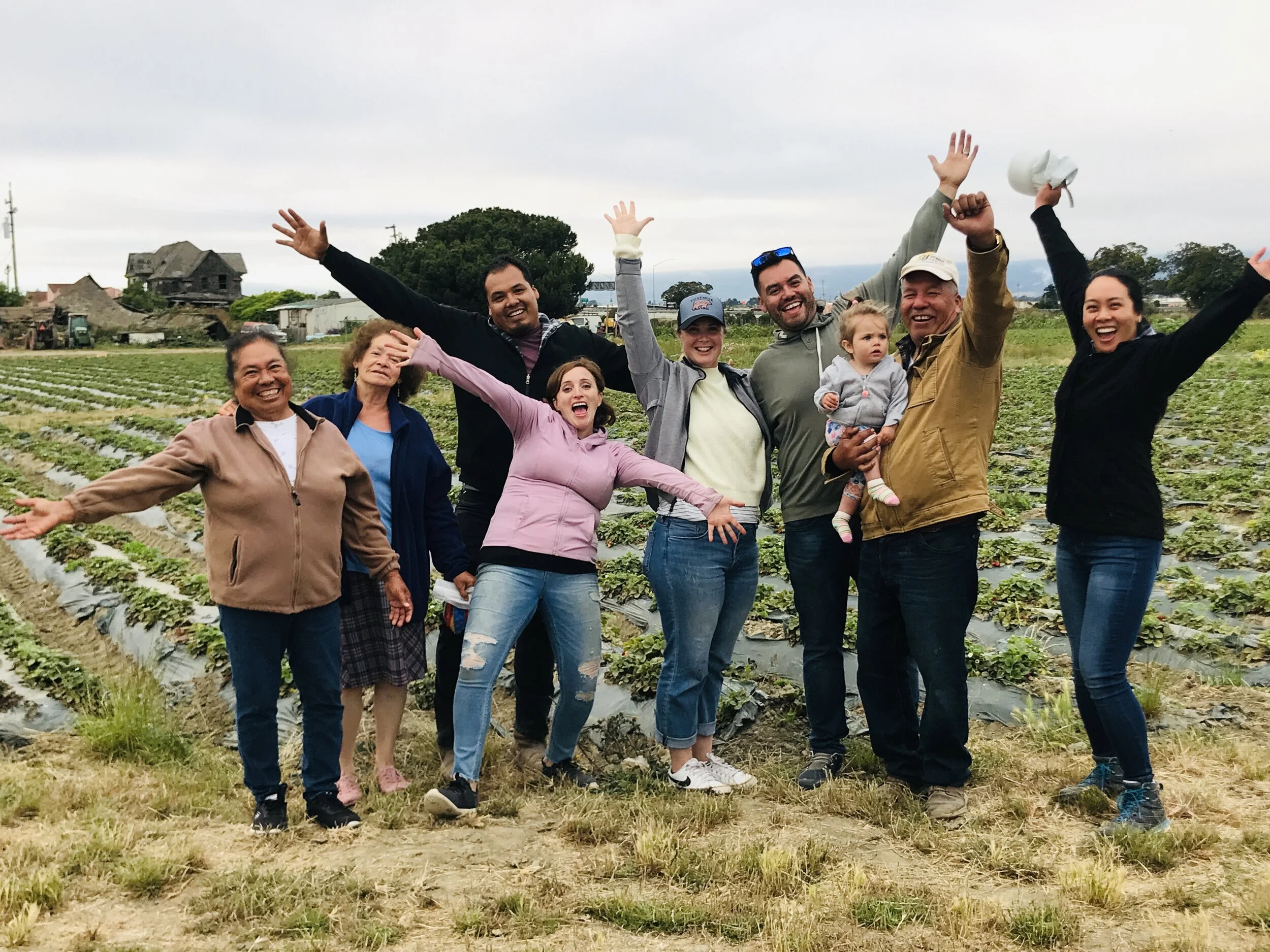A Most Special July 4: Visit To Yerena Farms
The Yerenas — L to R: Poli’s sister, Silvia, Ricky, Nora (Ricky’s wife), other Nora (Adrian’s wife), Adrian, Poli, Flora (Adrian and Nora’s adorable daughter, one of Poli’s many grandchildren)
As a budding micro business owner, finding time to balance all of our tasks is a daily struggle. It comes down to prioritization and triaging, and letting some things take longer than expected. Take this blog post for instance. I've been wanting to write it for weeks now, but am only now getting to it during my "vacation." Knowing firsthand how much of a struggle it is to carve out time for non-barebones work, I was touched when the Yerena Family not only happily obliged my request to let me visit their farm, but also invited me to join them for their July 4 family barbecue. I was tickled pink.
But I was also hesitant to accept such a generous gesture. I know that giving a tour of their farm isn't part of the job; they're not paid for that. I didn't want to overstep. Yet, Adrian, the oldest Yerena son, said without hesitation, “Come! Bring your friends! And bring beach gear since the beach is close by!” This is the magic that is Yerena. They take pride in their work, they work super hard, they grow amazing produce, but beyond that, they have the biggest and most generous hearts and are all about the people.
My customers who have been with me for a while know I'm a Yerena Farms fan. While I could gush all day about Yerena, let me stick to the juicier bits of this July 4 gathering and share the parts where my mind was blown.
But first, for some context: Apolinar (Poli) started Yerena Farms a couple of decades ago, beginning with conventional farming and later transitioning into organic farming, eventually becoming fully organic. His wife, Silvia, and his three sons, Adrian, Ricardo (Ricky), and Alex help him run the business. I'd met Poli, Silvia, and Alex in person a couple of times since they are always at their stand at various San Francisco farmers markets. Meanwhile, I am most familiar with Adrian since he runs their door-to-door delivery program and I've been ordering from him on average twice a month since the strawberry season began. Meanwhile, Ricky was always the mysterious "scientist" brother who got to work in the greenhouses and introduce new berry varieties. Luckily for me, I got to meet Ricky at the family gathering! Watch this short 2-minute video from CUESA by Fox Nakai to put faces to their names and get a glimpse into the magic that is Yerena Farms.
A quick run-down -- My sense is Poli is the traditionalist in the family -- he goes by his years of experience and his connection with the land and plants. He's mellow, contemplative, and appears stern but actually has a very charming wit and sense of humor. Adrian is very action-oriented, throw spaghetti at the wall type -- he started their delivery service during COVID to avoid laying off any of their employees (and it worked!), and he mentions to me every month a new vendor he's sourcing from or suggesting a way we can collaborate and incorporate my pies into his delivery service. Adrian is punchy, energetic, and the life of the party, yet warm and inviting. Ricky, the middle son, meanwhile, is more quiet. But he's a brainiac and once you tap into his passions, he can spew facts and knowledge like no other. Ricky studied plant science in college, and took his experience working alongside his dad and combined it with his science knowledge to become a double whammy power consultant for Ag businesses nationally and internationally.
To share a quick taste of Ricky, within five minutes of meeting him, he said something along these lines to me: "Planting the crops is the easy part. It's preparing the conditions for the planting that's hard. The soil quality, how the plant grows, etc...they're all equations and formulas. If you have the formulas down, the plant will do what you want it to do. I've got dragon fruit growing in my backyard and that's because I managed to get the conditions right." My jaw dropped and let’s just say I latched on to Ricky to ask more questions.
I learned so much during this visit and I wanted to get it down in writing before I forget any more of it. I've definitely forgotten a handful of the information, and I hope I don't let Ricky down. But here are some of the more interesting bits I learned:
1. Driscoll and sharecropping. Poli started as a sharecropper growing conventional berries for Driscoll. It wasn't until after years of hard work that he managed to save enough to start leasing his own land and growing for himself. But Poli is one of the "lucky ones." Lots of folks never earn enough or get the status in this country to be able to start their own farms. Sharecropping is the modern day form of slavery. Ricky at one point shared the percent of land Driscoll owns in Watsonville. It was a jaw-dropping number. I thought it was 70%, but my friend thinks he said 40%. I'll need to follow-up on this, but either way, it was a big number. Ricky went on to share that Driscoll requires their sharecroppers to use only their seeds. But Driscoll has so many sharecroppers they end up competing with each other. Driscoll, after all, controlled one-third of the US Berry Market in 2017, according to Wikipedia. It then becomes a vicious race to the bottom because Driscoll sharecroppers then need to grow more to earn more, but the more that is produced, the less they earn per pound of berry, and then the more they need to produce...See how that’s a downward spiral? And Driscoll doesn't care, since that's not their problem. They only care that lots of Driscoll berries are making it out onto the market. It's all the more infuriating to visit their website and see them touting messaging such as the one pictured above.
2. Whole Foods made an offer to Yerena but wanted a huge cut. Trader Joe's also offered, but wanted to dictate the selling price. I can't remember which, but one or both also wanted to be the only ones with a contract, and wanted to take the majority of their berries. Yerena said yea right! We're better off without you.
3. Poli went into organic farming not only because he believes in taking better care of the land, but also because it made financial sense. Produce pricing is all a delicate balance. The more a produce is out there, the less a farmer can sell that produce for. Poli went into organics partially to set himself apart, and since there is less organic fruit out there, he can sell it for more per pound, thus being able to work less. On top of that, Poli has an incentive to grow different varieties of fruit because folks will pay a premium for those. Case in point, I couldn't resist their boysenberries, and although they were something like $1.50 more per pound than their blackberries, the flavor was so much more unique and nuanced, that I went for it. Farmer Joe growing conventional strawberries and limited to Driscoll's seeds likely isn't growing Mara Du Bois and Seascape berries. In fact, looking at their website, I can't even find the variety name of any of their berries except for their concocted "Sweetest Batch Berries." Yes, they may be employing the same technologies used to create the ollaliberry, or tayberry, or any other berry mix out there, but when they start using language like "Specially picked at the peak of ripeness, our Sweetest Batch™ Strawberries are a unique berry variety that’s hand-selected for its perfectly snackable size, well-rounded aroma and extra-sweet flavor." I'm giving major side-eye. First of all, no matter what variety, Poli is picking his berries at their peak. Second, what does it mean to be "hand-selected"? Third, if this variety was selected for size, aroma, and flavor, and we generally see perfectly uniform, beautiful-looking berries, we can be pretty sure they sacrificed flavor and aroma for size and shape. Yerena's berries come in various shapes and sizes, but they're all tasty. Lastly, what the heck does "well-rounded aroma" mean? That just sounds like middle of the road to me -- i.e. bleh. OK, I'll stop with the hardcore bashing. Back to the main point, beyond just being more environmentally sound (which I'll address in the next point), growing organic has allowed Poli to grow more variety AND create a business that isn't about a race to the bottom.
Poli walking the rows.
4. Poli uses fabric softener to keep deer away. That was just one of several neat techniques Poli employs to remain spray free and organic. He's strewn silver ribbon on his fences to scare away pest birds. He peppered the field with sunflowers to attract "good bugs", and grows beans next to squash to employ the Three Sisters agricultural technique of growing nutritionally beneficial crops side by side to augment one another's growth. He had some pumpkin plants sprouting randomly among his strawberries, but instead of getting rid of it, he let it take its natural course. He employs crop rotation to replenish the soil of its depleted nutrients, along with cover cropping. Also, Ricky will help Poli test the soil quality to know if any pH tweaking is needed. Poli, in one of his deeper streams of thought, was sharing how he only sells produce he is proud of, and he didn't want any bad produce getting out there, so he pointed out a few areas on the farm there were strewn berries that didn’t meet his mark and are composted to be rotated back into their soil. As we walked down the rows Poli pointed out how the rows are closer together, indicative that they do not use heavy machinery as that would require the rows to be farther apart. He may also have been referring to tillage as well, though I didn't know enough to pick up on what he was referring to. He mentioned they try to have their strawberry plants last three years, which probably cuts back on tillage. It was really meditative to watch Poli walk up and down each row looking for ripened fruit and picking them to share with us to eat. By the next day these fruit would they'd be overly ripe. But testament to how efficiently they operate, these ripened fruit were not a common sighting. His employees had harvested just the day before, and their youngest, Alex, was selling that fruit that very day. Yes, despite it being July 4, someone in the family was still working and yes, they operate 7 days a week.
5. Ricky, has his eyes on a grand vision. Given all of the new technology he is picking up on as an Ag consultant, Ricky wants to start his own farm that uses new technologies to not only grow his crops more efficiently, but also to grow more variety, and perhaps also grow crops that one would not naturally find in the area. As a somewhat traditionalist who views vertical farming, hydroponics, aquaponics, etc... with a lot of suspicion, I asked if he was worried about possible adverse effects we are not aware of. He replied that they do a lot of testing and he's not too worried. Ricky's stance, I believe, is that these technologies can make the lives of farmers so much easier, while also helping us produce tastier food, so why not?
6. "But then what about terroir?" I asked Ricky. He said, yes, terroir is very real. But then, I asked, is terroir obsolete if everything comes down to an equation or formula? If you're managing to grow dragon fruit in your backyard in Watsonville, does terroir matter anymore? He said yes, definitely. That's because given where one is, one still can and should take advantage of the land's natural offerings. It's simply a matter of using the technologies to further augment what nature can do. I'm still feeling iffy about this, but it doesn't help that I know very little about these new technologies, plus I don't like messing with nature.
7. Soil type actually comes down to the farmer's preference. I was surprised to learn this, since from my limited experience with indoor plants, I thought that soil type was based on the plant's preference, not the farmer's. According to Ricky, each soil type comes with their advantages and disadvantages and it comes down to what work the farmer wants to put in. I think he said Poli prefers clay since it holds in the nutrients and water better, but it's more labor intensive. Meanwhile, Ricky prefers sandy since he doesn't want to break down hard soil as much, but is happy amending the soil.
8. Most of the plants we buy from Trader Joe's come from tissue culture. I wasn't even sure what tissue culture meant, and Ricky explained it beautifully, although his explanation did require me to dig back into my high school chemistry knowledge of remembering the difference between meiosis and mitosis. But I remembered! When he mentioned how prevalent tissue culturing is, I was pretty surprised. I'm not sure how I feel about it...since I should do more reading up on it...but my gut tells me I'm sad about it.
9. There are now robots in greenhouses that can detect which plants need more water or a certain nutrient and apply the spray accordingly. *Mind blown* Pros: less waste, I presume. Cons: sounds weird. I was going to say fewer jobs, but if we can shift our mindset around work...that might not be such a bad thing.
After typing all of this up, I'm realizing how rudimentary my knowledge of agriculture and gardening is, and that perhaps little of this information is new to you, my dear reader. But hopefully some of it was new? As for me, I was having a field day (badum ching!) learning all of this. Poli and the entire family never once made me feel stupid or ignorant. Part of what I so appreciate about them is their patience and willingness to educate their consumers about their products and the hard work that goes into it. Again, I realize this isn’t part of their job, but they are willing to take one for the team to show the general public just how much goes into being a small-scale farmer. They’re an inspiration.
To make the day even better, the farm tour was followed by an amazing Mexican barbecue feast prepared by Adrian (a former chef) and Silvia (home style cooking is unbeatable), meeting the wives and the children/grandchildren, and toasting with shots of Don Julio to many more fun gatherings to come. I am grateful beyond words to have gotten to meet the Yerena Family - they’re a beautiful family and I would put my dollars toward them rather than Driscoll’s any day. This was an unforgettable July 4, and I couldn't have asked for a better way to celebrate our country's birthday than to have it filled with blending of cultures and ideas, sharing of passions and values, generosity, openness, and humanity. Our country already has these beauties in so many of its corners, but sadly, it is still lacking in many other corners, and our systems have yet to embrace and encourage it.
